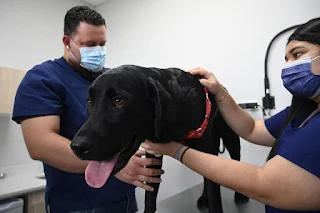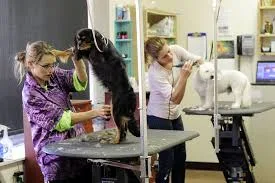With all the news going around about this "mysterious" illness affecting dogs, it seems like a good time to talk about routine pet care and staying ahead of any problems that may occur.
We discussed this illness before in the previous post and you can read that here.When you adopt a pet, it is a life-long (for the pet) commitment. You assume total responsibility for the care and health of that animal. In return, the pet will love you and look up to you and obey you. We all know that having a pet is a wonderful experience. Pets enrich your life more than anyone can say.
One of the things we need to do is be organized about keeping them healthy, the same way we do for keeping our children healthy and safe. In that vein, you need some type of way to keep up with routine health items. Having a checklist for the normal and routine things you need to do is a time saver and I have created a simple checklist for you here. Just click this link to get a copy.
As for this "mystery illness" going around, there are some things you can do to be proactive and try to protect your pet.
1. Know your pet's normal demeanor--By being familiar with what is normal behavior, you will be alerted when something is "off".
Here are a list of things to look for:
Dog respiratory illness symptoms include:- Coughing and sneezing
- Difficulty breathing
- Rapid breathing
- Wheezing or nasal whistling
- Dehydration
- Difficulty exercising
- Fever
- Nasal or eye discharge
- Loss of appetite
- Weight loss
- Lethargy
Experts encourage dog owners to contact their veterinarians immediately if any of the symptoms occur, especially those that can lead to pneumonia.
2. Make sure you are feeding quality food to your pet. I am aware that we all are suffering from this economy, but food is really not a good place to cut back. We really are what we eat, so quality in makes quality life.
3.Try to limit or eliminate totally having your pet interacting with strange or unfamiliar animals. Just like during the pandemic, we had to limit our interactions with others. Pets can't wear masks or use antiseptice hand cleaners, so the next best thing is to keep them isolated as much as possible.
4. If your pet goes to a groomer or a daycare facility, be sure to ask them about the measures they are taking to prevent outbreaks of illness to pets there. They should be aware of this situation and they should be doing something to prevent their clients from becoming sick.
5. Have the numbers of both your regular veterinarian as well as a 24 hour ER veterinarian available in case you need them. In emergencies, every second matters and you don't want to lose time searching for these.
6. If you pet becomes sick, put that pet into some type of quarentine if you are a multiple pet household. There is so much unknown about this illness that you don't want to take any chances with your family.
7. Don't panic. Your pet will respond to your emotional state and become agitated and frightened if you are in a frenzy. Remain calm, treat the symptoms and get your pet seen by the vet as soon as humanly possible.
8. Know that this illness requires agressive treatment and the cost will be high, so be prepared for the bill. If possible, have pet insurance on your pet, or at least have a credit account you can use for emergencies.
The news about this illness is not good, except for the number of dogs dying is not astronomically high. There have been deaths but unfortunately it happens. The current thought by vets all across the country is that the sooner you catch it, the better the outcome. So, know your pets.
Resources:










